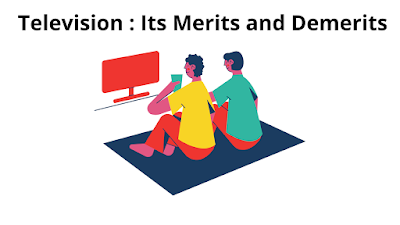Hints: One of the wonders of science-invention in 1926 by John Baird-first broadcast in 1929 by BBC-begins in India in 1959 – the process of telecast-different types of programmes-role of TV in literacy drive role in national integration-social role in Western countries-negative aspects.
Perhaps among the wonders of modern science and technology, television occupies the highest rank. It not only serves as one of the best mass media, but it also draws the whole world within the periphery of the four walls of our drawing rooms.
The modern world is totally indebted to Scottish scientist John Logie Baird for inventing television in the year 1926. The British Broadcasting Corporation was the first to broadcast television signals in 1929. The broadcasting of television signals in India began in the year 1959.
Initially, television broadcasting was for rural areas. AIR Delhi took nearly five years to arrange for telecasting daily programmes. Television broadcasting is based on photography and its instant transmission through electronic waves for reproduction on the TV screen after a very complicated electronic process.
Television at the same time delights and instructs us in various ways. Certainly, it serves as one of the best media of propaganda for Government and non-government issues of a country. Television also encourages scientific aptitude and outlook by broadcasting many programmes based on science and technology. Lessons on Science, Mathematics, Geography and other disciplines are telecast for the benefit of the students.
Television provides an opportunity to watch the discussions held by the intellectuals right before our eyes, which becomes of much help for enriching our knowledge about issues and subjects. Television can also enlighten our illiterate and ignorant masses in the rural areas and as a result, their mental horizons get wider.
Ultimately, this educative role of television helps the common mass to overcome the narrowing influence of regionalism, casteism, racialism and thus, promotes national integration. Programmes telecast on the TV screen on subjects like agriculture, health and hygiene, family planning and nutrition are of immense help to the common mass.
Through carefully planned television programmes it should be possible to send a message for the basic cultural unity of India. In the Western countries, television is used even to run factories and offices; to control traffic; to detect shop-lifting; to check theft and to restrict the entry of the undesirable persons in any premises. Television is also extensively used in space technology.
Besides the bright aspects of television, there are darker sides also. Spending too much of time in watching television is somewhat called addiction, which make the people unsocial in keeping them jailed in their drawing-room. We often read about some juvenile crimes committed by the young ones which are the effect of watching different crime shows telecast on the TV screen.
In another opinion, television is a great luxury for the developing country like India, where more than 50% of people live under the poverty line. It may be said in conclusion that people living in villages do not get much benefit from the television.
Also read:
